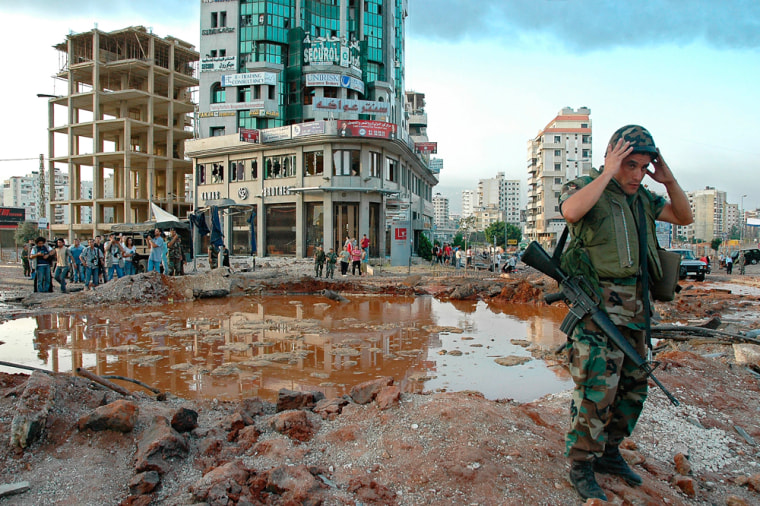BEIRUT, Lebanon — It's hard to believe, but until this week, Beirut was back!
When many Westerners think of the Lebanese capital, they think of all the kidnappings, of a city that was basically bombed out and burned up.
But for the last several years, it has enjoyed tremendous economic prosperity.
Restaurants have been restored, tourists have been coming here, prices for real estate have gone through the roof, and it’s not uncommon to see sports cars like Ferraris on the street.
A few weeks ago, I was here and working on just that story — it was even called “Beirut is back.”
It was supposed to be about how the economy has revived, the restaurants are full, the nightclubs are hopping, and the beaches are full of women in bikinis.
Big change
Today I’m standing here wearing a flak jacket, watching the airport burning, and there are more strikes expected.
You can't really see the planes, but you can hear them circling in the sky and occasionally catch a glimpse of the white trail behind the jet.
And you can certainly hear and see the impact as the air strikes hit the Rafic Hariri International Airport.
Now, instead of looking for real estate or trying the latest sushi restaurant downtown, Beirut residents are stocking up on food, water and generators because they think the power could go, and there is a general sense of sadness and disappointment.
So a lot of Lebanese are very disappointed that now they are once again at a state of war and the infrastructure that they spent so much time and money rebuilding is being destroyed, literally in front of their eyes.
Old survival skills kick in
As a result, when we came in here on Thursday night, people were leaving, but I wouldn’t call it a mass exodus. There are not tens of thousands of refugees suddenly on the border.
The main road out, through Syria, which we drove in on, was attacked last night. There are a few dirt roads and back roads that people can travel on, so the road is not entirely cut off, but it is very difficult. Coming in and out of this country has become a risky and challenging procedure.
This has only been going on for a few days, so it’s not like the city is running out of food and water. People are sort of hunkering down, partly because the roads are dangerous right now, and it's not clear that leaving would be much safer.
People lived through war for so long and they don’t want to have to go back to that. All those old survival skills for coping in wartime kick back in and it’s very uncomfortable.
People here know what it feels like to live in a besieged city that is being attacked where militia groups are in charge and there are gunmen on the streets. The Lebanese know that perhaps better than anyone else.
Old divisions resurface
Those we’ve spoken to are divided about the crisis.
Although it might seem unusual, some of them support this Israeli offensive against Hezbollah because they have had enough of the Shiite militant group.
The opinions generally falls along sectarian lines. Many Christians in Beirut don’t support Hezbollah and are generally favorable of this operation. Others, mostly Shiites, oppose it.
It's not surprising that the country is divided along sectarian lines.
So, that is a danger for this country. Many people in Lebanon say they never really recovered from the civil war and this is bringing back many memories of that period, in the same way the assassination of Rafik Hariri was a pivotal moment that exposed some of these deep divisions.
But at the same time, everyone here opposes the fact that Israel is attacking the infrastructure. No one likes to see their airport being torn up. There has been so much of an effort to rebuild this country, no one wants to see all of that work destroyed.
